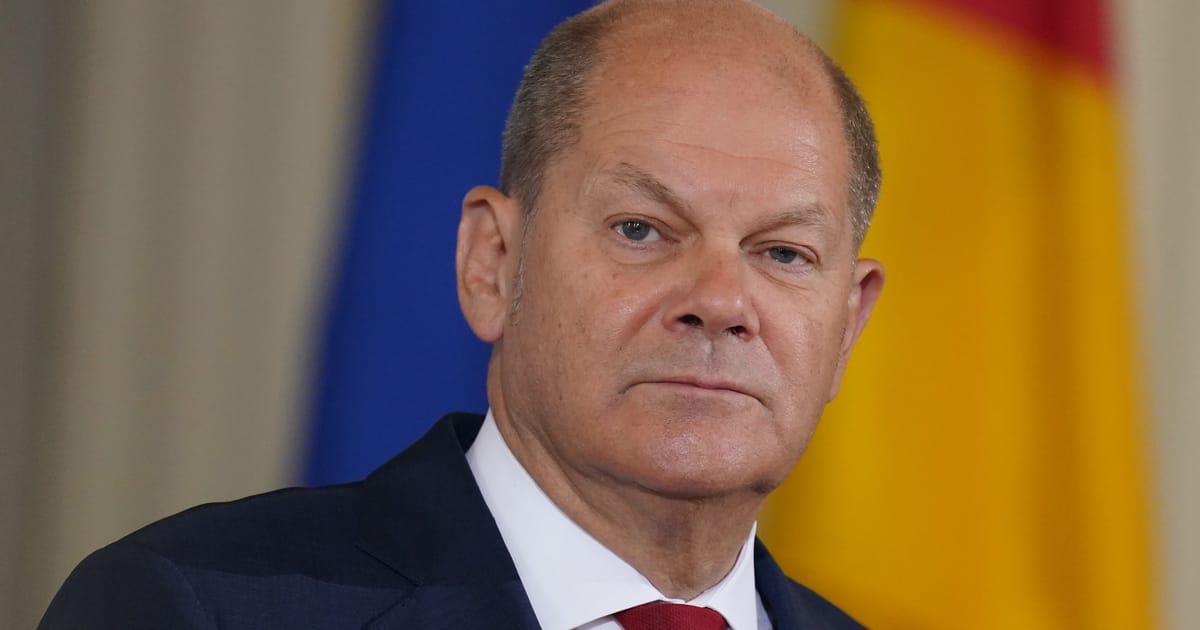
Germany’s Scholz flies out under fire to meet Xi
Two pillars of Germany's economic success story — cheap energy supplies from Russia and low security spending — collapsed this year.
As Chancellor Olaf Scholz flies out to meet Chinese President Xi Jinping on Friday in Beijing, he wants to make sure that the all-important third pillar — cozy relations with China — will remain stable for Germany Inc.
To his critics, he's making exactly the same mistakes of overreliance on China as Berlin previously made with Russia.
Scholz, who will be accompanied by a high-ranking delegation of German business leaders, will arrive in the early hours of Friday and it's already clear that no big U-turn is coming on the one-day trip.
Scholz is in no mood to rock the corporate boat as Europe's largest economy creaks under the burden of high energy prices and the shock of last week's announcement that chemical giant BASF plans to relocate part of its business activities away from Europe. Berlin still sees China as part of the answer: Germany has long used China as a massive manufacturing base and its specialized small- and medium-sized engineering companies are deeply locked into Chinese production.
In an op-ed for POLITICO and the German newspaper Frankfurter Allgemeine Zeitung, Scholz said Berlin's goal was not to "decouple" its industry from China and also echoed warnings from his predecessor Angela Merkel that the U.S. should not whip up a new Cold War against China.
"Germany of all countries, which had such a painful experience of division during the Cold War, has no interest in seeing new blocs emerge in the world," Scholz wrote. In a thinly veiled criticism of Washington, he noted Beijing's rise did not justify "the calls by some to isolate China."
Contentious timing
The timing and the circumstances of the visit by Scholz — who will be the first Western leader to meet Xi after his recent groundbreaking appointment for a third term as Chinese leader, and the first G7 leader visiting China since the outbreak of the COVID pandemic — have sparked controversy among European partners and also within the government in Berlin.
German Foreign Minister Annalena Baerbock made scant effort to hide her skepticism.
"The chancellor has decided the timing of his trip," the Green politician told reporters this week, adding that "it's crucial" that Scholz raises key issues that his three-party government agreed in its coalition treaty, such as respect for human rights, equal business and investment opportunities as well as the respect for international law, in his discussion with Xi.
On the European stage, allies such as France are concerned that Scholz might undermine efforts to reach a joint EU approach toward China that is more assertive when it comes to confronting Beijing on unfair trading practices or its support for Russia's war against Ukraine.
French President Emmanuel Macron proposed to Scholz late last month that they should travel jointly to China with their respective business delegations to not only show political unity but also demonstrate that Xi cannot divide European countries by playing their economic interests off against each other.
Thorsten Benner, the director of the Global Public Policy Institute in Berlin, criticized Scholz's decision to reject Macron's proposal and to instead invite the chief executives of BASF, Volkswagen and Siemens on his plane.
"By bringing a business delegation stacked with some of the most pro-Beijing CEOs, Scholz appears to continue with Merkel’s 'Business First' approach to China. Much of the rest of Europe sees this as 'Germany First,'" he said.
A French diplomat echoed that sentiment: "What is very clear, and what the president also reminded Olaf Scholz of, is that the objectives that we can have at the economic level with China and which every one shares ... must not take precedence over our security interests and over the values that we must defend as members of the European Union and as G7 countries," the diplomat said.
Investment woes
In his op-ed for POLITICO and FAZ, Scholz pushed back against the accusations his trip was driven by domestic priorities.
"German policy on China can only be successful when it is embedded in European policy on China," the chancellor wrote. "In the run-up to my visit, we have therefore liaised closely with our European partners, including President Macron, and also with our transatlantic friends."
Scholz said that "even in changed circumstances, China remains an important business and trading partner for Germany and Europe — we don’t want to decouple from it." Still, he did concede that German companies needed to take steps to reduce "risky dependencies" in industrial supply chains, particularly in terms of "cutting-edge technologies."
Scholz's China push has raised questions whether the chancellor, as well as the CEOs who are traveling with him, have drawn the right conclusions from Germany's troublesome dependency on Russian energy.
Last week, Scholz pushed through a controversial deal that allows Chinese shipping giant Cosco to buy a 24.9 percent stake in a logistics firm operating the "Tollerort" container terminal in Hamburg, one of three such terminals in Germany's biggest port.
The sale, which has been criticized as a gift to Xi ahead of Scholz's China trip, was shunted through by the Social Democratic chancellor in the face of protests from his two coalition partners, the Greens of Foreign Minister Baerbock and the liberal Free Democratic Party (FDP) of Finance Minister Christian Lindner.
Green politicians are particularly concerned that the chancellor's trip undermines the harder line toward Beijing that government ministries have been working on for months as part of a forthcoming China strategy.
"The chancellor himself in the matter of weeks ruins what his coalition had agreed, sows distrust against Germany among our allies and helps China divide and conquer," fumed Reinhard Bütikofer, a Green MEP and chair of the European Parliament's China delegation.
The U.S., which is pursuing a policy of decoupling from China, also cautioned Germany against the Cosco deal, a senior U.S. State Department official said on Wednesday, Reuters reported.
Last week, it was also reported that the German government was examining whether to approve a Chinese takeover of the chip production of Dortmund-based company Elmos, a move that would defy advice from the domestic intelligence agency.
It's the economy, stupid
On the business side, big companies like Siemens, BASF or Volkswagen seem undeterred by Germany's Russia fiasco and have been pushing Scholz not to abandon the business-friendly China policies of the Merkel-era — particularly now, as they hope for a further investment boom as the COVID pandemic recedes.
"I think there's an urgent need for us to get away from China-bashing and take a bit of a self-critical look at ourselves," BASF chief Martin Brudermüller said last week, as his company announced the relocation of some of its chemical production from Germany to China.
Siemens is also planning "massive investments" in China, particularly in the sensitive sector of industrial software and factory automation, despite warnings that this increases dependency on the People's Republic, German daily Handelsblatt reported last week.
With Russia business having collapsed, China — which has been Germany's biggest trading partner for the past six years — remains a crucial economic partner.
Although the victory of left-wing presidential candidate Luiz Inácio "Lula" da Silva in Brazil raised hopes that the giant but stalled EU-Mercosur trade deal might finally be ratified next year, it would still take a longer while before the benefits of that agreement kick in and open alternative new markets for German companies.
However, not all of Germany Inc. is backing the China-friendly course. Crucially, Siegfried Russwurm, from the business association BDI, warned this week that "the cooperation, especially with powerful economies such as China, must be redefined."
Instead of simply looking toward Beijing, Russwurm urged the EU to "join forces to develop key technologies and industrial skills in which Europe wants to be a leader in the future." Tellingly, the BDI chief won't join Scholz on his China trip.
Scholz, for his part, stressed in his op-ed that he believes the sheer size of China makes it necessary to cooperate closely with the country, be it on the fight against climate change or economic matters. China, "with its 1.4 billion inhabitants and its economic power will, of course, play a key role on the world stage in the future," he wrote.









